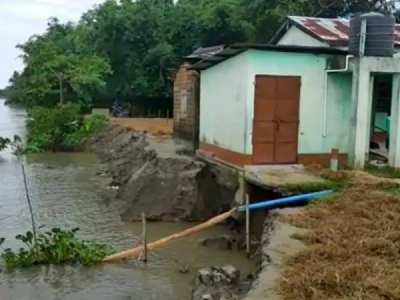
Posted on July 12, 2020
According to the Assam government data, the Brahmaputra river has wiped out nearly 4,000 sq km — area larger than Goa which forms about 7.5 per cent of the total area of Assam.
Over 5 lakh families in Assam have been displaced due to floods and soil erosion — problems the state is facing for the last six decades.
According to the Assam government data, the Brahmaputra river has wiped out nearly 4,000 sq km — area larger than Goa which forms about 7.5 per cent of the total area of Assam.
Even as Assam grapples with floodwater, 62-year-old Md. Abul Ali and his family are now preparing to move to a safer place after they lost everything to soil erosion caused by the Brahmaputra river.
Abul Ali, a resident of Bhurbandha area in Assam’s Nagaon district, had lost his agricultural lands and house due to river erosion.
“I have lost everything. River erosion is not a new problem. We are facing it for the last couple of years. The river swallowed everything. We are now forced to leave this place as the government has not taken any necessary measures to solve this problem. We have now no money. Now, god will help us,” Abul Ali said.
Not only Abul Ali, but there are a large number of families in Assam who suffer displacement and hardship across the state.
Thirty-year-old Foridul Islam, a local youth of Bohoti NC area in Goalpara district, said that more than 2,000 families of the area were forced to move to other safer places after they lost their lands and houses due to flood and soil erosion by the Brahmaputra river.
 According to the Assam government, soil erosion by rivers continues in many districts of Assam. (Photo: Hemanta Kumar Nath/India Today)
According to the Assam government, soil erosion by rivers continues in many districts of Assam. (Photo: Hemanta Kumar Nath/India Today)
Many school buildings, religious institutions, public properties were also destroyed due to river erosion in the area.
“The Brahmaputra river has eroded thousands bigha of agricultural lands, school building. Over 2,000 families were forced to move to other places due to flood and river erosion problems,” Foridul Islam said.
Raju Barua, leader of Assam’s farmer organisation, Krishak Mukti Sangram Samiti (KMSS), said that over 5 lakh families across the state have been displaced due to flood and erosion problems.
“We appeal to the both the Centre and the state government to help the people who had lost everything to floods and river erosion,” Raju Barua said.
According to the Assam government, soil erosion by rivers continues in many districts of Assam due to which, on average, nearly 8,000 hectares is lost annually.
The width of the river Brahmaputra has increased up to 15 km at some places due to bank erosion.
These two major problems bring the third crisis in Assam every year — economic loss.
According to the Assam government data, average annual loss due to flood in Assam is to the tune of Rs 200 crore and thousands of bigha of farmland gets eroded by rivers each year.
Jayanta Pathak, a professor at Assam Engineering College, said that the state runs on agriculture and thousands of hectares of land are rendered uncultivable due to flood and river erosion, which further impacts the state economy.
“Since independence, we have been trying to manage the flood problems in the state. Now erosion has become even a bigger problem than the flood. Erosion is now becoming a major problem of the state and which was also taken up more or less a national disaster problem at some point of time. But, not much has been done and probably, we have not been able to provide the appropriate flood management which is required to mitigate the erosion problem,” Jayanta Pathak said.
Dr Bibhas Sarma, who is working in the field of flood and river erosion problems of Assam for the past several years, said that the major portions of embankments in the state were constructed in 1960-70.
“Construction of embankment policy was taken in 1954 and we are still going with construction of embankments as a temporary measure. We need storage reservoirs at the foothills of the tributaries which are contributing maximum sediment discharge to the river. If we can’t do that, a solution is not possible. The government has taken a concept of dredging of the river, but the expert committee said that it is feasible and dredging of the river will not solve the problem because the sediment loads are so high that within hours, the dredged portion will fill up,” Dr Bibhas Sarma said.
Dr Bibhas Sarma also said: “The geographical area of Assam is 78,438 sq km, of which 56,194 sq km is covered by the Brahmaputra river valley and the Barak river valley, along with two hill districts, covered the remaining 22,244 sq km.”
Source: indiatoday





